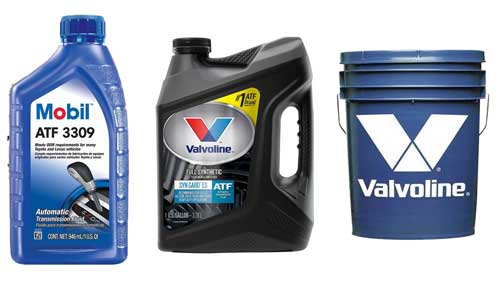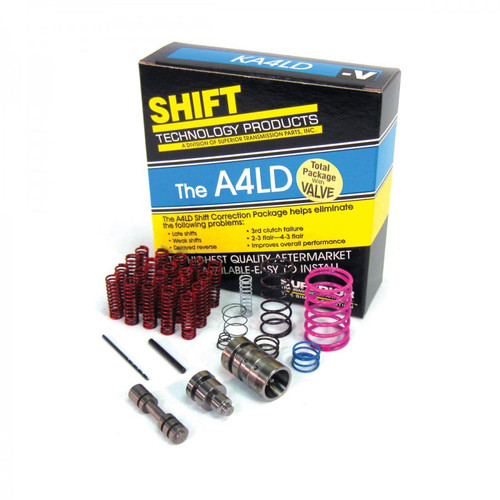Can transmission fluid be used as brake fluid

Can transmission fluid be used as brake fluid? No, transmission fluid cannot be used as brake fluid. Although both are liquids that help to lubricate and cool components in your vehicle, they are not interchangeable.
Brake fluid is designed specifically for use in brakes and helps to transfer force from the pedal to the brakes themselves, while transmission fluid is made to lubricate the gears in your transmission.
Swapping out one for the other can cause serious damage to your car.
The main reason is that transmission fluid is designed to withstand high temperatures, while brake fluid is designed to boil at a lower temperature. This means that if you use transmission fluid in your brakes, it could lead to premature failure of your brake system.
So while you might be able to get away with using transmission fluid in a pinch, it’s generally not recommended.
What Can I Use Instead of Brake Fluid
Brake fluid helps transfer the force from your foot on the pedal to the brakes themselves. When brake fluid becomes contaminated or low, it can cause problems with your brakes.
That’s why it’s important to know what you can use instead of brake fluid in a pinch. First, check your owner’s manual. Some vehicles have specific requirements for their brake fluid.
If yours does, be sure to use the recommended type. Otherwise, any DOT 3 or DOT 4 brake fluid will work in most cases. If you’re out of brake fluid and need to top off your levels, you can use mineral oil or automatic transmission fluid in a pinch.
However, neither of these are ideal substitute and should only be used until you can get proper brake fluid. They’ll both work to some degree, but may not provide the same level of performance as real brake fluid.
In general, it’s best to avoid using anything other than proper brake fluid in your vehicle’s braking system.
However, if you find yourself in a bind and need a quick fix, these substitutes will do in a pinch. Just be sure to get proper brake fluid as soon as possible so you can keep your vehicle stopping safely.
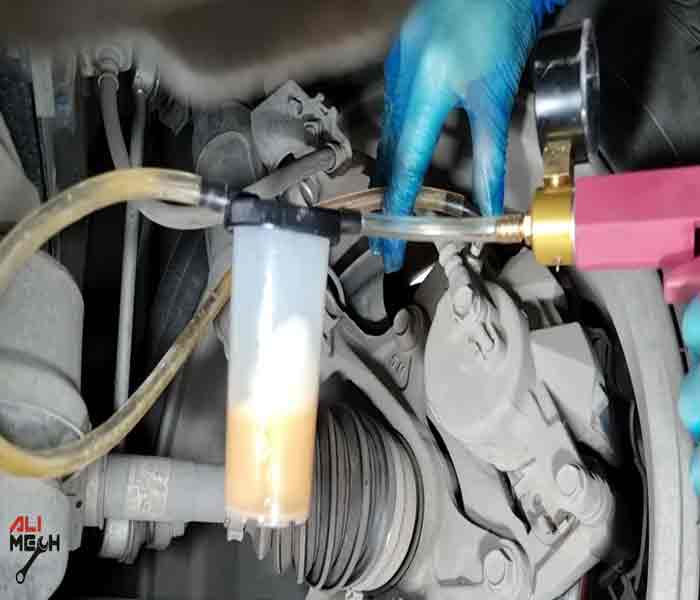
Read More About How Do You Know If Your Transmission Fluid Is Low Without A Dipstick?
If I Don T Have Brake Fluid What Else Can I Use
If you are in an emergency situation and cannot obtain brake fluid, you may be able to use mineral oil as a temporary substitute. However, this should only be done as a last resort and you should replace the mineral oil with brake fluid as soon as possible.
Mineral oil does not have the same properties as brake fluid and may cause damage to your brake system over time.
Can You Use Transmission Fluid for Power Steering Fluid
So, if your power steering system is running low on fluid, topping it off with transmission fluid is a perfectly acceptable way to get the job done.
Of course, there are some caveats. First and foremost, you should only use transmission fluid that’s compatible with your power steering system. Check your vehicle’s owner’s manual or ask your mechanic to be sure.
Secondly, while using transmission fluid in a pinch will work just fine, it’s not ideal because it has a different viscosity than power steering fluid.
That means it won’t lubricate your system as well, which could lead to premature wear and tear. So, if at all possible, stick with a power steering fluid specifically designed for your car.
Can I Use Power Steering Fluid As Brake Fluid
When it comes to your car, it’s important to know which fluids can be used interchangeably and which ones should never be mixed. After all, using the wrong fluid in your car can cause serious damage. So, can you use power steering fluid as brake fluid?
The short answer is no. Power steering fluid and brake fluid are not interchangeable. While they may look similar, they’re actually quite different.
A power steering fluid is a hydraulic fluid that helps make turning your steering wheel easier. Brake fluid, on the other hand, is a hydraulic fluid that helps transfer force from your foot on the pedal to the brakes themselves.
Mixing these two fluids can cause problems with both your power steering and your brakes.
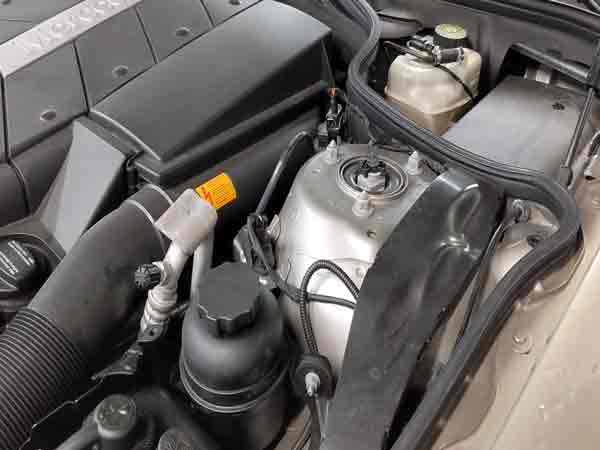
Read Also T56 MANUAL TRANSMISSION Type, Capacity, Flow, Change Interval
Brake Fluid in Transmission
Brake fluid is a type of hydraulic fluid used in brake systems. It is typically glycol-based, although some silicone fluids are also used. Brake fluid is designed to transfer force from the master cylinder to the slave cylinders at the wheels.
It must be able to withstand high temperatures and maintain its viscosity over a wide range of temperatures. Brake fluid can become contaminated with water, dirt, or other foreign particles. This can cause braking problems and decreased performance.
To prevent this, it is important to regularly check your brake fluid level and condition. If you notice any contamination, have your brakes serviced by a qualified technician?
Can Brake Fluid Be Used As a Lubricant
Brake fluid is a type of hydraulic fluid that is used in braking systems. It is also known as dot 3 brake fluid. The main purpose of brake fluid is to transfer force from the brake pedal to the brakes themselves.
It also lubricates and protects the components of the braking system, including the calipers, wheel cylinders, and master cylinders. Brake fluid can be made from different materials, but most are based on glycols or silicone. Brake fluid can be used as a lubricant in some situations.
For example, it can be used to lubricate caliper pins or guide pins. It can also be used to lubricate rubber seals and O-rings. However, there are some caveats to using brake fluid as a lubricant.
First, it is important to use the correct type of brake fluid for your application. Second, you should avoid using too much brake fluid, as this could cause leaks.
Can You Use Hydraulic Fluid for Brake Fluid
The answer is no, you cannot use hydraulic fluid for brake fluid. While they may seem similar, these two fluids serve very different purposes in a vehicle. Hydraulic fluid is used to power the brakes, while brake fluid is used to transfer the force from your foot on the pedal to the brakes themselves.
Mixing these two fluids can cause problems with your braking system and should be avoided.
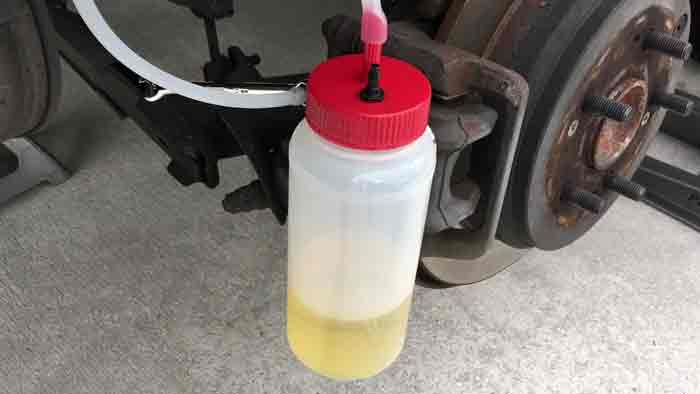
Dot 3 Brake Fluid in Transmission
Dot 3 brake fluid is a type of glycol-based brake fluid that can be used in transmissions. It has a higher boiling point than Dot 4 fluids, making it ideal for use in high-performance vehicles.
Dot 3 fluids are also compatible with most DOT 4 and DOT 5 fluids, making them a good choice for use in mixed fleets.
What Happens If You Use Transmission Fluid As Brake Fluid?
If you use transmission fluid as brake fluid, it will likely damage your car’s brake system.
The main difference between the two fluids is that transmission fluid is designed to lubricate and cool the moving parts in your car’s transmission, while brake fluid is designed to create friction that stops your car.
Transmission fluid is also much thinner than brake fluid, so it won’t be as effective at stopping your car. In addition, using transmission fluid in your brakes can cause corrosion and leaks.
What Fluid Can You Substitute for Brake Fluid?
There are a few fluids that can be used as substitutes for brake fluid, but it is important to note that not all of them will work in all vehicles.
Some common substitutes include:
- Mineral oil
- DOT 3 or 4 hydraulic fluid
- Silicone brake fluid
It is always best to check your owner’s manual or with a qualified mechanic before using any substitute, as using the wrong type of fluid can cause serious damage to your braking system.
Can You Put Transmission Fluid in the Brakes?
No, you cannot put transmission fluid in the brakes. Transmission fluid is for lubricating and cooling the moving parts in your transmission, while brake fluid is for transferring the force from your foot on the pedal to the pads and shoes that press against your rotors or drums to slow down or stop your car.
Is Brake Fluid the Same As Transmission?
There are many types of automotive fluids, and each one has a specific purpose. Brake fluid is used to apply the brakes in your vehicle, while transmission fluid is used to lubricate and cool the moving parts in your transmission.
Although they serve different purposes, both brake fluid and transmission fluid are necessary for your vehicle to function properly.
What is Power Steering Fluid?
Power steering fluid is an essential part of any car’s performance, as it helps power steering systems to function correctly. It is a hydraulic fluid that acts as a lubricant and is used to provide power to the steering system in cars.
Power steering fluid is used in the pump of the power steering system and is located near the engine.
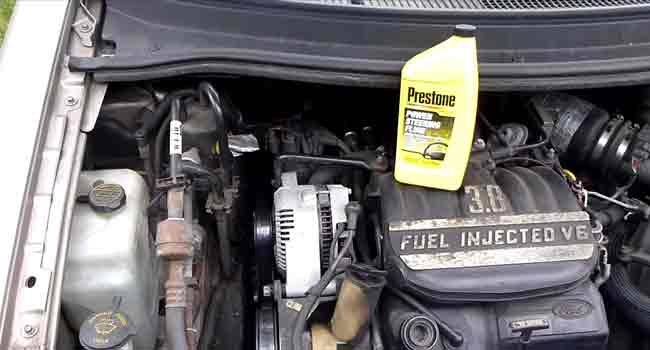
What is Brake Fluid?
Brake fluid, sometimes referred to as hydraulic fluid, is a type of fluid used in hydraulically operated brake systems to transfer pressure from the brake pedal to the brakes. This allows the vehicle to slow down or come to a complete stop when the brake pedal is pressed.
Brake fluid is a hydraulic fluid made up of mainly glycol-ethers, plus some additives such as corrosion inhibitors and water absorbers. As they are corrosive and prone to absorbing water, brake fluids must be kept fresh and changed regularly.
Can you use brake fluid as transmission oil?
The short answer to this question is no, brake fluid and transmission fluid are not interchangeable and should never be used as substitutes for each other.
Though both liquids serve the purpose of lubricating and cooling the components of the vehicle, their compositions are quite different and their use cases must be kept separate.
Brake fluid is designed to have a high boiling point to reduce vapor lock and keep it from boiling over under pressure. As cars are subject to constant braking, the brake system needs to be able to withstand high temperatures from continuously being under extreme pressure.
Is brake fluid and transmission fluid the same thing?
No, brake fluid and transmission fluid are not the same things. Brake fluid and transmission fluid both play important roles in the operation of your vehicle, but they’re totally unrelated.
Brake fluid is mainly responsible for stopping your car while transmission fluid supports the transmission system in a car, regulating the flow of gears.
What fluid can be used as transmission fluid?
Well, the answer to this question depends largely on the type of transmission and the type of fluid your vehicle requires.
Generally speaking, transmission fluids are typically transmission-specific, meaning that you should use the fluid that is designed for your specific vehicle. SAE 80W and 75W-90 C can be used as transmission fluid.
For example, if your vehicle uses an automatic transmission, then you should use a Dexron III ATF (Automatic Transmission Fluid).
This is a synthetic transmission fluid that has been developed by General Motors since the mid-1980s; it is also the most common type of ATF and is used in a variety of vehicle makes and models.
FAQs
Difference between brake fluids
The primary difference between glycol-based and silicone-based fluids is their chemical composition. Glycol-based fluids are essentially alkaline solutions that are composed of glycerol, while silicone-based fluids are composed of silicone
Will brakes work with no brake fluid?
Without the presence of brake fluid, your brakes won’t be able to generate the necessary pressure and force needed to stop the vehicle.
That’s why it’s important to always check your brake fluid levels regularly and to make sure they are at the proper levels. If your brake fluid levels are low, then it’s time to top them up.
What Happens If I Add Transmission Fluid to My Brake System?

Conclusion
Can transmission fluid be used as brake fluid? No, transmission fluid can’t be used as brake fluid, but it’s not recommended. Transmission fluid is designed to lubricate and cool the moving parts in your transmission, while brake fluid is designed to create friction so your brakes work properly.
If you use transmission fluid in your brakes, it could cause damage to the braking system and reduce its performance.

